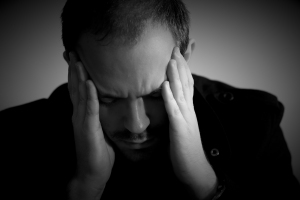Blog about the best-selling psychiatrist and author’s conclusions about depression. Read the Blog
Peter D. Kramer: Standing Against Depression
It’s Just Cancer – Get Over It.

I arrived in New York City’s JFK Airport yesterday. My family and I are visiting friends over the weekend. While walking through the terminal, I saw a large advertisement from the Depression Is Real Coaliation. If you haven’t heard of this organization, check out their website. The ad read as follows:
YOU’D NEVER SAY, “IT’S JUST CANCER, GET OVER IT”. So why do some say that about depression?
When I first developed depression over seven years ago, at least five people told me to “get over” or “snap out of” it. Get over or snap out of “what” I often thought. I searched my mind for some frame of reference.
When people are too preoccupied with themselves and their problems, we have all thought or told them to end their narcissistic nonsense. “Life isn’t so bad. So stop complaining,” is our common refrain. We judge them to be selfish, inconsiderate or even burdensome. Yet, were such people suffering from a physical illness – say cancer, diabetes or heart disease – we would never imagine saying such a thing for fear of being thought cruel, rude or simply ignorant.
Sadly, all too often, people treat people with depression as if they don’t have an illness, but a problem of self-absorbtion. And for people who have experienced the Black Dog, they know exactly what I am talking about. Such comments make us doubt ourselves: “maybe I am just a complainer,” or “I’m just selfish.” But deep down, we may sense otherwise. If we do, we know that something is seriously amiss.
Critical comments from others made me feel like the accused. I imagined what must have been going through their minds: “You’re faking it. Now let’s get back to the business of practicing law.” They just didn’t seem to believe me. That didn’t believe that I had a chemical imbalance in my brain, that it wasn’t my fault and that this had made me sick – very sick.
In the beginning of my journey, I wanted everyone to understand me. I wanted them to just say, “It is okay, Dan. You have a medical illness and need treatment.” Sometimes this happened and sometimes it didn’t. When it didn’t, I felt hurt and even angry. I thought, “Just step in my shoes for an hour and you’ll know that what I’m experiencing is true.” We need to be careful who we choose to expect sympathy from. Make no mistake about it, we need allies when we are in a depression. Most often, it will come from other depressives who have “walked the walk,” people who have known and loved others with depression, or just big-hearted, everyday people.
In his book, Against Depression, psychiatrist, Peter Kramer, M.D., takes an unflinching account of the illness that is depression. Check out his Blog. Kramer cites a number of scientific studies linking depressive symptoms with abnormalities in the hippocampus and prefrontal cortex of the brain. Kramer also emphasizes that depression is more than a brain disease. “It is a neurologic, hematologic and cardiovascular disease. Overactivation of stress pathways causes a liability to clots and [heart] arrhythmias – and along or together, they predispose to heart attacks, silent strokes, disturbed mood and sudden death”, he wrote. Listen here to Dr. Kramer being interviewed by National Public Radio.
Richard O’Connor, Ph.D., author of the best-selling book, Undoing Depression: What Therapy Doesn’t Teach You and Medication Can’t Give You, makes clear why depression should be likened to other major medical illnesses:
“Heart disease is a good analogy to major depression. Heart disease is “caused” by a complex of factors, including a genetic predisposition, emotional factors like how we handle stress, and habits like diet and exercise. You don’t catch heart disease from an infection. You develop it gradually, over time, as plaque builds up in your arteries. Once you cross an invisible threshold marked by standards of blood pressure and cholesterol levels, you have heart disease . . . . Depression may be a similar threshold disease – genetic and biochemical factors may determine a different level of stress for each of us that, once reached, puts us over the edge into depression.”
It is critical to remember that depression isn’t your “fault.” However, it’s equally important to remember that it’s your responsibility. We must take responsibility to get better and stay that way. Yes, the critical judgments of others hurt. That’s why it is imperative to not go through this alone. Join a depression support group. They have also dealt with the judgments of others. There truly is strength in numbers.








